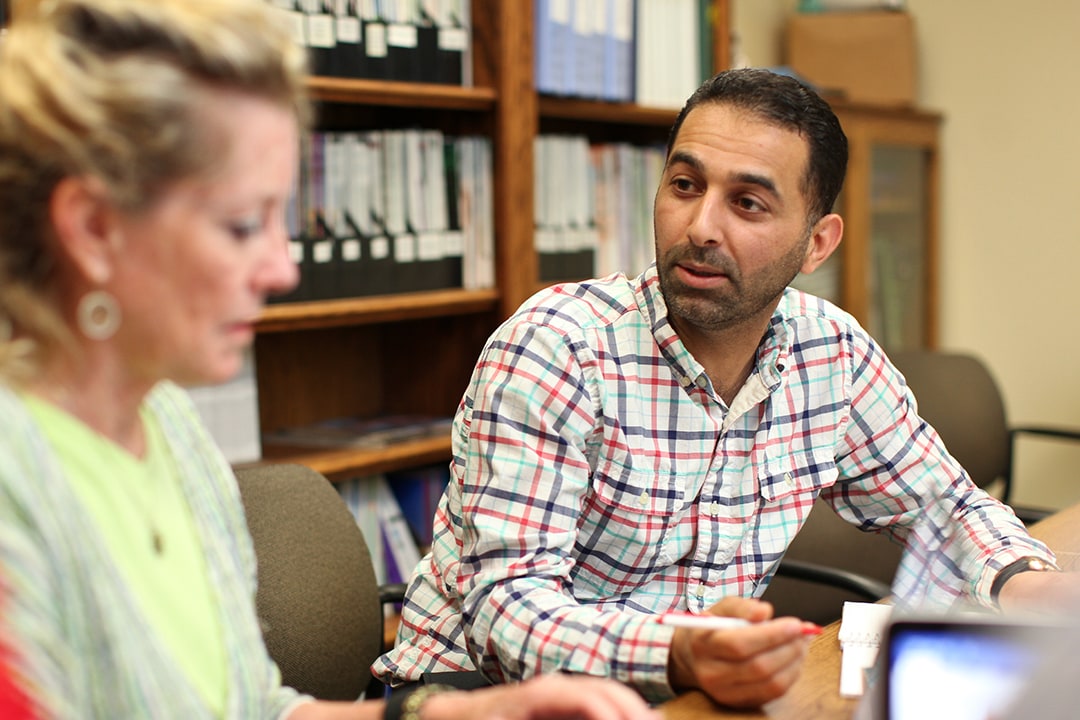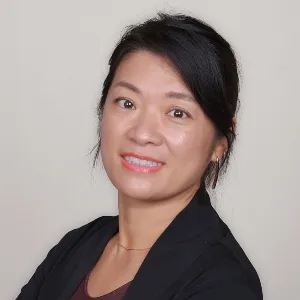
Nursing, PhD
Earn a PhD in Nursing at Azusa Pacific University
You’ll expand your career and graduate qualified to serve in a variety of roles in academia, government, and health care. You’ll be ready to improve the health of society and contribute to the future generation through research. You can customize your degree according to your areas of interest and by choosing between three concentrations: Health of the Family and Community, International Health, and Nursing Historical Research.
APU Ranked Among Best Grad Schools by Money
Azusa Pacific University was ranked in Money’s Best Graduate School Programs 2025 for education and nursing, focusing on affordability, value, and return on investment.

Program at a Glance
Upcoming Events
Virtual Information SessionTuesday, August 26, 5-6 p.m.Virtual Same-Day Admissions Event
Wednesday, September 17, 4-8 p.m.
Program Information
- Units: 55
- Cost per Unit: $1,160
- Base Cost: $63,800*
Locations
- Monrovia, Online

Gain Hands-on Experience
- Articulate how nursing is informed by the Christian faith.
- Learn how to professionally contribute to the body of nursing knowledge.
- Build the knowledge and ethical framework to promote social change.
- Conduct research in the areas of wellness promotion and health maintenance.
- Develop, test, and utilize theoretical knowledge that will improve health outcomes.
By the Numbers
Get Started
Program Details
The PhD in Nursing program is designed for nurses who hold a master’s degree in nursing or a related field and wish to pursue a doctoral degree in nursing. Graduates of this program, in roles as academicians, contribute to the body of nursing knowledge to improve the health of society and prepare the next generation of nurses.
Browse the tabs below—if you have questions, visit the Student Services Center page, and we’ll make sure you get the info you need.
Admission Requirements—Domestic Applicants
The university graduate and program admission requirements below must be met before an application is considered complete.
Admission of students into the PhD in Nursing will be evaluated by each of these criteria.
- Graduate application for admission
- $45 nonrefundable application fee
- Official transcripts from all institutions leading to and awarding the applicant’s
bachelor’s and master’s degree from a regionally accredited institution and all post-baccalaureate
study
An official transcript is one that Azusa Pacific University receives unopened in an envelope sealed by the former institution and that bears the official seal of the college or university. A cumulative minimum 3.5 (on a 4.0 scale) grade-point average on the posted degree is required for regular admission status. Provisional admittance may be granted to individuals with a lower GPA if competency can be shown through multiple measures. - Transcripts should show completion of a BSN and master’s degree (master’s degree may be in nursing or another field).Graduate-level statistics course, taken within the last five years
- Graduate-level nursing research course
- Graduate-level nursing theory course
- Evidence of written creative work and/or scholarly papers
- Written statement of educational objectives, specific focus of research, and career goals
- Current curriculum vitae
- Two letters of recommendation from persons who are suited to evaluate applicant’s qualifications for PhD education in nursing, including at least one from the applicant's direct supervisor and/or a previous faculty member
- Faculty member(s) interview with the prospective student
- Status as a licensed registered nurse; evidence of current licensure as a registered nurse in the State of California is mandatory at the time of program entry
Send official transcripts to:
Office of Graduate and Professional Admissions
Azusa Pacific University
PO Box 7000
Azusa, CA 91702-7000
[email protected]
Admission Requirements—International Applicants
Azusa Pacific University is authorized under federal law by the U.S. Citizen and Immigration Services and the U.S. Department of State to enroll nonimmigrant, alien undergraduate and graduate students. APU issues and administers both the I-20 and DS 2019 (F-1 and J-1 status documents respectively).
To apply for a graduate program at APU, the following requirements must be fulfilled in addition to meeting the domestic applicant and program-specific admission requirements specified above.
International applicants must also:
- Demonstrate proficiency in English through a placement test with the Academic Success Center, or through a TOEFL/IELTS score that meets program-specific requirements. Refer to APU’s English proficiency requirements to learn more. Request that official test scores be sent to APU. All other forms of proof indicated in the English proficiency requirements must be submitted directly to International Services.
- Provide a Graduate Affidavit of Financial Support (PDF) and a bank statement from within the last six months proving financial ability to pay for education costs through personal, family, or sponsor resources.
- Submit a copy of a valid passport showing biographical data, including your name, country of citizenship, date of birth, and other legal information.
- Get foreign transcripts evaluated. International credentials (transcripts, certificates, diplomas, and degrees) must be evaluated by a foreign transcript evaluation agency. View our policy and a list of approved Foreign Transcript Evaluation Agencies.
Send official transcripts to:
Office of Graduate and Professional Admissions
Azusa Pacific University
PO Box 7000
Azusa, CA 91702-7000
[email protected]
What to Expect
After all admission materials have been received by the Student Services Center, the faculty or department chair reviews the applicant’s file. The applicant is notified in writing of the admission decision.
Screening of Applicants
Both the Student Services Center and the School of Nursing handle screening of applicants for admission into the nursing PhD program. Screening of applicants' portfolios is conducted by the Student Services Center and is evaluated according to the admission criteria. The school reviews completed applications for admission to the doctoral program to discern an applicant’s academic qualifications and preparation for advanced graduate study. Upon completion of the screening and review process, the Nursing Doctoral Admission Screening Committee forwards a list of qualified/alternate applicants to the Student Services Center. The Student Services Center officially notifies applicants of admission decisions.
Many financial aid options are available to make your PhD in Nursing affordable.
Delivering high-quality graduate programs takes a comprehensive support system. Your investment in an advanced degree includes those services and personnel that partner with you in pursuit of higher education. Below is a detailed breakdown of the fees associated with the benefits and services included in your degree program.
School of Nursing Fees
| | Cost |
|---|---|
| Master’s Degrees, Credentials, and Most Certificate Programs (per unit) | $895 |
| PhD in Nursing and Doctor of Nursing Practice (DNP)(per unit) | $1,160 |
| Oncology Nurse Practitioner Certificate (per unit) | $1,160 |
| Audit (per unit) | half-price tuition |
| Nursing Clinical Fee (per semester; includes malpractice insurance) | $600 |
| Graduate Nursing Advanced Practice Lab Fee (per course) | $275 |
Nursing courses may require additional fees. View a complete list of university fees.
All stated financial information is subject to change. Contact the Student Services Center at (626) 815-2020 for more information.
Financial Aid
Several types of financial aid are available to graduate students. The resources range from federal loans and state grants to, for some graduate programs, fellowships and scholarships. For details about financial aid available for your program, please contact the Student Services Center at (626) 815-2020.
Military Benefits
Military members—and in some cases their spouses and dependents—qualify for financial assistance covering tuition, housing, and books. Azusa Pacific is a Yellow Ribbon University and Military Friendly School, so you can be confident that you’ll receive the benefits and flexibility you need to complete your education.
Program-Specific Aid
For more details on these scholarships and funding opportunities, as well as other possible resources, please contact the School of Nursing at (626) 815-5386.
Nurse Faculty Loan Program
The Nurse Faculty Loan Program is a government loan program set up to increase the number of qualified nursing faculty by providing loans to students in advanced nursing education programs. Students must be pursuing a MSN or doctoral nursing degree. The NFLP loans will be forgiven—up to 85 percent of the amount received—over a consecutive four-year period if the student commits to serve as full-time faculty at a school of nursing following graduation. Faculty at private universities, state schools, and community colleges are eligible. Students receiving these loans must also complete the nursing education courses prior to graduation.
School of Nursing Alumni Tuition Discounts
APU’s School of Nursing offers an alumni tuition discount for APU alumni starting in the following graduate programs:
- MSN in Healthcare Administration and Leadership
- MSN in Nursing Education
- PhD in Nursing
- Doctor of Nursing Practice (DNP)
Students must be in good academic standing and maintain satisfactory academic progress with a minimum cumulative grade-point average (GPA) of 3.0. Students must be enrolled at least half-time. If qualifications are met, the discount may be renewed each term. APU will pay $500 per term (up to $2,000 over the course of the program). This discount cannot be combined with other institutional aid. Contact Student Financial Services for complete eligibility details.
Note: Award and eligibility are applicable for the 2022-23 academic year and apply to students admitted beginning fall 2020. The discount is subject to change.
To view specific requirements and coursework information, visit the current academic catalog:
Overview
Take your nursing career to the highest level with APU’s DNP to PhD pathway. RNs with a DNP or transferable doctoral-level units can earn a PhD through 55 units of coursework (you can transfer up to 15 units) and a dissertation. You’ll graduate prepared to discover new knowledge to inform and improve the nursing discipline. Possible career roles include nurse scientist, research scholar, and nursing faculty.
To discuss your interest, contact the PhD program manager at [email protected].
Details
The DNP to PhD pathway enables professionals who have a DNP, or transferable doctoral-level units, to further utilize the DNP program’s evidence for improving patient and population outcomes, and expand their research skills to further nursing science and clinical practice, as they earn a PhD. The PhD in Nursing program is a 55-unit-plus-dissertation program. The School of Nursing may accept for transfer up to 15 units of coursework completed in an accredited DNP program, thereby requiring the student to complete 40 units of doctoral coursework in residence, and complete the dissertation, to earn the PhD in Nursing degree.
The proposed plan of study can be completed on either a full-time (6 semesters) or part-time basis. Upon application to the PhD program, a transfer evaluation/gap analysis of the DNP coursework will be conducted by the Nursing Doctoral Admission Committee.
You’ll Gain the Skills to:
-
Advance into a research-focused doctoral degree program, discovering new knowledge to inform the nursing discipline.
-
Lead in translational research and implementation science.
Benefits of this Program
-
Access to the Nurse Faculty Loan Program, which provides financial assistance through loan forgiveness for RNs who want to teach in nursing schools.
-
Tailored plan of study with a transfer evaluation to ensure successful completion.
-
Opportunity to transfer up to 15 units of doctoral coursework from an accredited DNP program, shortening your path to the PhD.
How many units do I take each term?
Students generally take 7-8 units per term. There are three terms per year, including summer.
How long is a term?
The fall, spring, and summer terms last 16 weeks.
How many hours does each class session require?
Typically each class meets 3 hours based on the number of units of the course.
For more information about the PhD in Nursing, contact the School of Nursing.
Study Progression and Graduation Requirements
Progression in the program requires active enrollment status and maintaining a minimum cumulative 3.0 GPA. Graduation requirements include a minimum cumulative 3.0 GPA, successful completion of the qualifying exam, dissertation proposal defense, and completion of original dissertation research.
Leaves of Absence
PhD in Nursing students in good standing and making satisfactory progress toward their degrees who must interrupt their studies for a compelling reason (e.g., illness, study abroad, family conditions, or crises) may petition for a leave of absence for a stated period of time not to exceed two years. Requests for a leave must be in writing and state both the reasons for the leave and the semester in which the student will re-enroll. Leaves of absence must be approved by the department chair and the dean of the School of Nursing in advance of the semester for which the leave is requested.
The petition for return to enrolled status should be filed one full term before the intended date of re-enrollment. If the student went on leave with conditions for re-enrollment, these must be fulfilled before re-enrollment may occur. If a student is on leave for two years, the Doctoral Admissions Committee, as well as the student’s advisor, the doctoral studies chair, and the dean will review her/his re-enrollment petition. Depending upon the amount of time elapsed, the student’s stage of study in the program, and the student’s academic activity during the leave, readmission may be contingent.
Examinations
Qualifying Examination
The qualifying examination is taken upon the completion of between 15 and 21 units of doctoral work, including GNRS 700, 701, 702, and 706. (The student must petition for exceptions.) The examination is comprised of a relatively brief paper (i.e., 25–30 pages) and oral review by a committee of faculty. The purpose of the paper is to encourage synthesis of first-year coursework as it relates to the student’s current research interest area. The focus of the paper specifies the student’s interest area with potential researchable questions and methodological approaches, together with relevant aspects of nursing theory, nursing knowledge development, and methods of inquiry. The subsequent oral examination provides the student an opportunity to formulate a synthesis of her/his thinking in response to questions.
Dissertation Proposal Defense
Successful completion of the dissertation proposal signifies competence to pursue independent research with the advice and guidance of the dissertation committee. The dissertation proposal defense allows the student to demonstrate familiarity with the state of the science in a particular area; awareness of currently active topics of investigation in the area; theoretical dimensions and design issues related to potential questions; and recognition of potential, practical, and ethical challenges arising at the intersection of research questions, population, and instruments.
APU Institutional Review Board
Following advancement to candidacy, the student must submit the appropriate paperwork to the APU Institutional Review Board (IRB) and any additional IRBs. Following approval from the IRB, the student may begin data collection.
Dissertation Defense
The dissertation reports the results of original, independent research of substantial but circumscribed scope, undertaken in consultation with the student’s dissertation committee. The student presents a prospectus or proposal specifying the question, method, design, data collection instruments or strategy, projected data analysis, plan for access to subjects/participants/data, and projected timeline for data collection, analysis, and dissertation completion.
The dissertation committee serves in an advisory capacity to the student and ensures that the dissertation research and the written dissertation demonstrate the student’s competence to conduct independent research in the discipline. Committee members work with the student throughout the process of data collection, analysis, and writing, with primary support provided by the chair/sponsor. When the student has substantially finished the work to the satisfaction of each committee member, the committee meets to hear the student’s defense of the overall work and the decisions it entailed, and to discuss the student’s plans for publication and post degree program of research.
Students may not have the degree posted to their transcript until the document has been accepted by the library and the School of Nursing. Any exceptions are by petition only.
If you have questions, we’re here to help! Connect with a representative who can walk you through the program details and application process.
Contact Your Admissions Representative
Additional Program Contacts
- Suzie Fox, Program Manager, [email protected], (626) 815-6135
- Jennifer Cunanan, Program Coordinator, [email protected], (626) 815-6000, Ext. 4481
School of Nursing
Phone
(626) 815-5386
Azusa Pacific University
PO Box 7000
Azusa, CA 91702-7000
Hours
Monday-Friday, 8 a.m.-4:30 p.m.
(voicemail messages left will be addressed on the next business day)
Student Services Center
Contact (626) 812-3016 or [email protected], and visit apu.edu/ssc for details on the admissions process, financial aid, and class registration.
International Services
International students should contact +1-626-812-3055 or [email protected], and visit apu.edu/international/.
- Azusa Pacific University is accredited by the WASC Senior College and University Commission (WSCUC).
- The baccalaureate degree in nursing, master’s degree in nursing, and Doctor of Nursing Practice at Azusa Pacific University are accredited by the Commission on Collegiate Nursing Education.
- The traditional baccalaureate nursing program, upper-division transfer (2+2/LVN to BSN) programs, entry-level master’s program, and the nurse practitioner program are approved by the California Board of Registered Nursing.
Career Outlooks and Outcomes
Featured Faculty

Linda Searle-Leach
Department Chair; Professor

Hong Li
Director, APU Institute of Health Research and Associate Professor

APU School of Nursing Receives $4.4 Million in Grants from HRSA
APU’s School of Nursing, the third largest producer of nurses in the state of California, received two grants totalling $4,396,200 from the Health Resources and Services Administration to help students afford a nursing education.